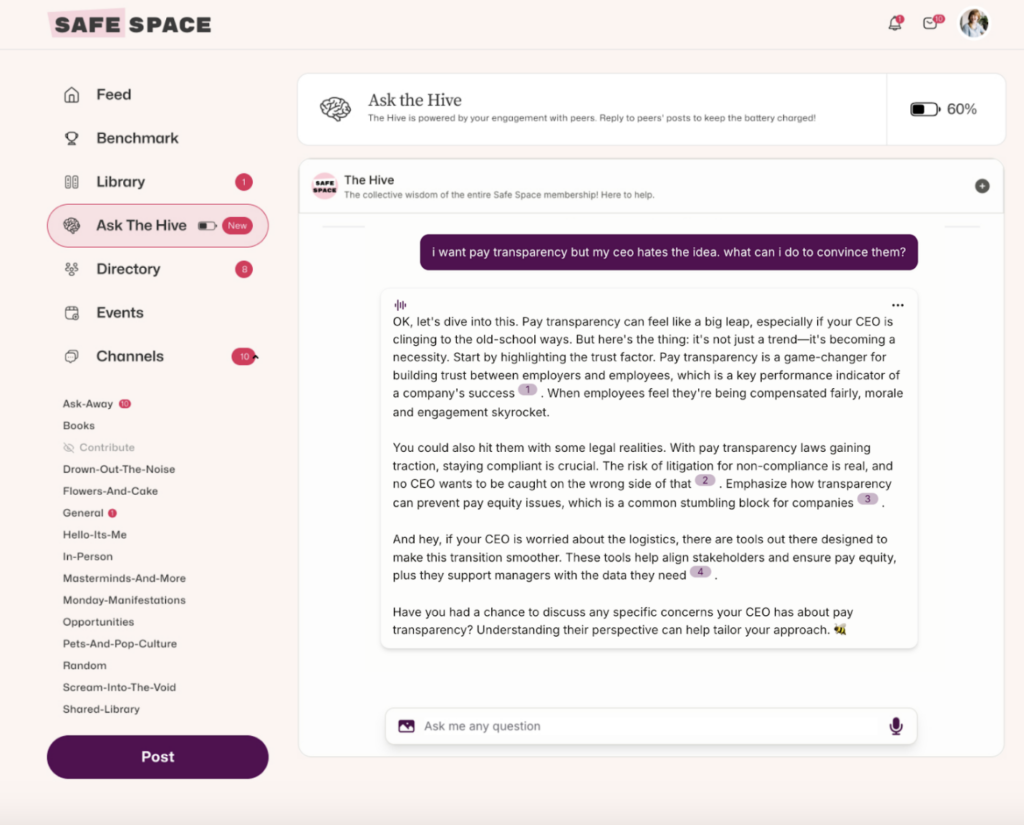
How do you fill your cup when you’re extremely burnt out?
Context: It feels like lately, I’m struggling so hard to find any sort of balance or rejuvenation in work/life. What are your strategies for managing and recovering from burnout?
Giuliana Hazelwood, Head of People & Talent @ Eating Disorder Recovery Specialists:
Aside from the very basic and boring stuff (like sleeping, seeing friends, drinking enough water, exercise, hobbies blah blah blah), two things I’d recommend seeking during burnout are novelty and self-confidence. Burnout sucks because you feel like you’re stuck in something you can’t get out of, so adding novelty to your day (even in very little ways) can add up and make a difference.
Novelty:
You can get creative with things that don’t require a lot of effort and recruit a little bit of your sense of fun. If you’re treat-motivated, give yourself a challenge to try every flavor of [insert your fave silly little beverage brand] for a week until you find your favorite. If you’re a cleaner/organizer, give your working space a makeover or do a deep clean of your desktop. Make cute names for your folders and change your background up to something that uplifts you.
Self-Confidence:
When you’re deep in burnout, it’s easy to feel like all this shit is happening TO you, and you’re just doing everything you can to keep afloat. Whether or not this is true, it’s a crappy state of mind to be in, and if you’re not careful, this can do a number on your self-esteem. Feeling hopeless and overwhelmed are kind of incompatible with feeling like someone who is amazing at life, great at their job, and can overcome challenges, set boundaries, and thrive.
So start small. Find a dumb stupid thing you like that you like that gives you tiny bumps of dopamine so your brain can remember what it feels like to enjoy accomplishing something! Creative projects are great for this, so are games. Spending time with kids, animals, or volunteering is also a great way to build this kind of confidence. If you can boost your self-esteem outside of work, I find that it’s easier to use that baseline as a reference point within a work context!
Sondra Norris, OD/OE Consulting:
I recommend a “reset” when burnout sets in.
Start with looking inside:
- what are your most important guiding principles (family, creativity, innovation, achievement, inner harmony, relationships, peace, etc.)?
- which ones are feeling most compromised from which parts of your life?
Then ask yourself to explore the cause of the compromise – be gentle with yourself so that you can discover if YOU are the source. Are you signing up for too much? Are your expectations unrealistic for the circumstances? Are you needing/wanting/expecting validation from outside yourself, rather than developing your own power source from inside?
Then do your best to identify the specific source(s) of feeling burned out, some examples might be:
- same tasks over and over
- great efforts not getting the impact we expected
- feeling “stuck” – whatever we’re doing is not getting us where we thought we’d be; we feel ourselves repeating the same patterns and can’t seem to shift when we know we should
- too many things that we feel are important so we try to do them all and end up feeling good at nothing
Then match up what you can shift, eliminate, reframe to support your compromised guiding principle(s).
Breaks are great, but they need to be intentional so that you don’t rubberband right back into burnout – often it gets worse because of our mindset. Especially if we’re externalizing the cause of our burnout – it’s easy to slip into victim and blame mode.
JOIN 150K+ HR LEADERS
Get insights, learnings, and advice on how to build companies and cultures that people actually love.
No spam. Unsubscribe any time.

How do you deal with imposter syndrome?
Context: Sometimes it feels like every problem on my desk is something I should have anticipated and fixed preemptively, or something I am too ignorant to have thought of before! Having so many tough convos with employees today, all of whom I want to support and help, but I only have so many resources and can only do so many things for so many people without considering the rest of the organization. I just want to make my company a better place to work and feel so incompetent and under-resourced. Gah!
Kathy Bryan, EVP Head of Marketing @ Electives:
I feel confident that almost every person in the world has imposter syndrome at some point. It’s a very normal feeling, and we should probably talk about it more often.
When you feel like an imposter, it often means you have high ambitions, and you don’t want to let anyone (including yourself) down. That’s a good thing.
So dig in. What are you trying to achieve? Do you need to prioritize or reset expectations? Do you need more support? Do you need training? Are there systems or processes you can implement to help avoid this feeling in the future?
You can’t be all the things all the time for all the people, and you’re not expected to have clairvoyance. Your imposter feelings are just your brain telling you to pause momentarily so you can figure out the best way to move forward. You’ve got this!
Here’s a blog post with more on the topic!
Joanna LaBounty, VP of People Operations @ Reach University:
Oh, I feel this so hard! First of all, you’re doing amazing – let’s just start there. But here’s what I think: it’s time to hit pause on the self-criticism and get into some self-love mode! How about creating an “I Am, In Fact, Amazing” mood board? You know, a little visual celebration of all the great work you are doing. Pop in some wins, shoutouts, the people you’ve helped, and all those moments when you’ve made your company better!
We care so much that it’s easy to feel like we’re not doing enough, but seriously, you can’t fix everything all at once. And that whole oxygen mask theory? It’s real. If we spread ourselves too thin or beat ourselves up for things outside our control, we’re just not at our best! So, breathe. Celebrate those small wins. You’re handling tough conversations, showing up for people – just don’t forget to show up for you too.
Rebecca Dobrzynski, Senior HR Business Partner:
I love what Kathy and Joanna have already shared. A few other things that might help:
- Keep a running list of accomplishments at least quarterly, and don’t sell yourself short! Everything from “these compliance tasks that have to be done were, in fact, done and on time – even if I was learning about them for the first time” to “I learned about this” to ” X person told me I helped them out.” This “evidence” helps because it is specific and because you can gain confidence as you watch it grow over time. Bonus: This will be a good place to pull any major wins whenever you’re updating your resume for your next gig!
- Be proactive and honest about what you don’t know. It might be a little counter-intuitive, but when you identify some areas where you know you have less knowledge and experience (even just a broad category like compensation or visa sponsorship), you can then make your own personal development plan to systematically start closing those gaps. Set realistic goals, and make sure when some of those goals are achieved, you move them to your list of accomplishments!
- Find someone who can remind you that you’re awesome and be your cheerleader when you need it… I wouldn’t recommend relying *only* on external validation, but we all need a boost occasionally from someone whose opinion we trust. Someone reasonably close to you can help remind you of your strengths when you’re feeling a little shaky!


